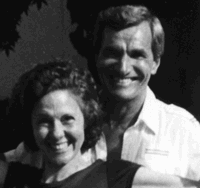

Mark Lenard
"Mark Lenard: A Class Act"
|
Preface Mark Lenard the actor, was best known as Sarek, Spock's father, and as a succession of noble aliens in Star Trek television and motion picture outings. He became forever linked to the IMF in December 1996, when he died after a short, valiant battle with that ogre that haunts our existence: multiple myeloma. His wife, Ann, talked with the Unknown Patient about her life with Mark and their struggle with myeloma. |
|
The Interview
Unknown Patient:
How did you and Mark meet?UP
: And the rest was history?